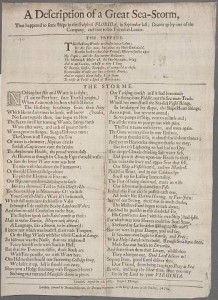“A Description of a Great Sea-Storm” (1671) describes a crew caught in a hurricane off the coast of Florida from a survivor’s point of view. Little is known about this two-column broadside, other than the time and place of publication. Sea narratives were not few and far between, and the theme of deliverance figures prominently in the literature. The author (“Sheelah”) expresses some sarcasm, and appears to be versed in the classics as well as the language of the local pub. The use of prayer, for example, suggests the trope of providence which pervades the literature, and the author wittily mentions that “the sea could do what no church ever could — make sea-men pray.”
Edited by Michael Sadler, University of South Florida St. Petersburg
Further Reading
Sievers, Julie. “Drowned Pens and Shaking Hands: Sea Providence Narratives in Seventeenth-Century New England.” The William & Mary Quarterly. Third Series, 63:4 (Oct. 2006): 743-76.
Wharton, Donald P. (ed.). In the Trough of the Sea: Selected American Sea-Deliverance Narratives. Westport, CT: Greenwood, 1980.
[Anonymous]. “A Description of a Great Sea-Storm, that Happened to Some Ships in the Gulph of Florida, in September Last; Drawn up by one of the Company, and sent to his Friend at London.” London: Printed by Thomas Milbourn, for Dorman Newman, at the King’s Armes in the Poultry, 1671.
The Preface.
The Blustering Winds are husht into a Calme;
No air stirs now, but what my Muse Embalmd,
Breaths forth to thee, dear Friend; Heaven smiles upon
My Paper, and the Sea turns Helicon;[1]
The Mermaids Muses all, the Sea-Nymphs, bring
Aid to my Genius, whilst to thee I sing
Of Storms, Gusts, Tempests, if compard to these,
Bermoodus Winds are but a Gentle Breez;
And to express them fully, I am faine
To raise in the Verse a kind of Hurrycane.
The Storme.
Nothing but Air and Water is in sight;
(I am no Poet here, since Truth I wright.)
When Eolus[2] with his Iron whistle Rouzes
The blustring breathings from their Airy houses,
Which like to Libertines let loose, will know
No Law to guide them, but begin to blow
The Sea to swell her teaming Womb, brings forth
Wave after wave, and each of greater birth:
Waves grow to Surges, Surges Billowes turn;
The Ocean is all Timpany, the Urn
Of water is a brimmer; Neptune drinks
So full a Cup it over-runs the brinks.
To Amphetrites[3] Health, the proud waves dash
At Heaven as though its Cloudy Face twould wash:
Or sure the lower Water now was bent
To mix with that above the Firmament;
Or the cold Element did go about
To put the Element of Fire out.
Our Ship now under water seems to sayle
Like to a drowned Tost in John Cooks[4] Ale
The Sea rould up in Mountains: O! tis such
Your Cottsall-Hills[5] a Wart, ift be so much,
Which fall again into such hollow Vales
I thought I’de crost the Sea by Land ore Wales;
And then to add Confusion to the Seas,
The Saylers speak such Babel words as these:
Hale in maine Bowlin, Mizen tack aboard;
A Language, like a Storm, to be abhorrd:
I know no which was loudest, their rude Tongues,
Or the Big Winds with her whole Cards of lungs.
So hideous was the Noise that one might well
Fancy himself to be with Souls in Hell;
But that the Torments differ, those Souls are
With Fire punisht we with Water here.
Our Helme that should our Swimming-Colledge sway,
We lasht it up, lest it should run away.[6]
Have you a Hedge seen hung with Beggars Fleeces?
So hung our tattered Mainsaile down in pieces.
Our Tackling crackt as if it had been made
To string some Fiddle, not the Sea-mans Trade.
Whilst her own Knell the Sea-sick Vessel Rings,
In breaking of her Ropes, the Ships heart strings,
As to repent, but never to amend;
So we pumpt th Ship, even to as little end;
For all the water we pumpt out with pain,
The Sea returns with scorne, and more again.
The Guns we carryd to be our Defence,
Heaven thunderd so, it almost ward them thence;
And yet to Heaven for this give thanks we may,
But for its Lightning we had had no Day.
The dropy Clouds drinking Salt water sick,
Did spew it down upon our Heads so thick;
That twixt the lover and upper Seas that fell,
Our Ship a Vessel seemd, and we Mackrell.
Pickld in Brine, and in our Cabines lye
Soust up for Lasting Immortality.
The Fear of being drowned, made us wish
Our selves transpeciated into Fish.
Indeed this Fear did so possess each one,
All lookt like Shotten-Herring, Or Poor-John:[7]
Nay of our saving, there was so much doubt,
The Masters Faith begun to tack about;
And had he perisht in this doubtful fit,
His Conscience sure (with his own Ship) had split.
For which way into Heaven could his Soul Steer,
Starboard or Larbord that still cries, No neer?
But we were in great danger, you will say,
If Sea-men once begin to Kneele, and Pray;
What Holy Church nere could, Rough Seas have done,
Made Sea-men buckle to Devotion,
And force from them their Letany, whilst thus
They whimper out, Good Lord deliver us!
So pray I too, good Lord deliver thee,
Dear Friend, from being taught to Pray at Sea.
Be wise, and keep the Shoar then, since you may
Go in by Land to your VIRGINIA.

